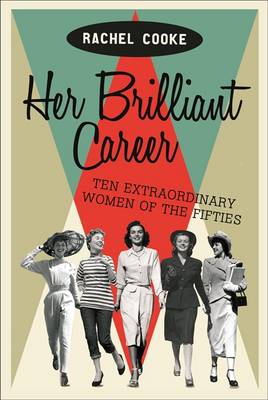
In her apron and rubber gloves, a smile lipsticked permanently across her face, the woman of the Fifties has become a cultural symbol of all that we are most grateful to have sloughed off. A homely compliant creature, she knows little or nothing of sex, and stands no chance at all of having a career. She must marry or die. But what if there was another side to the story? In this book Rachel Cooke tells the story of ten extraordinary women whose pioneering professional lives - and complicated private lives - paved the way for future generations. Muriel Box, film director. Betty Box, film producer. Margery Fish, plantswoman. Patience Gray, cook. Alison Smithson, architect. Sheila van Damm, rally car driver and theatre owner. Nancy Spain, journalist and radio personality. Joan Werner Laurie, editor. Jacquetta Hawkes, archaeologist. Rose Heilbron, QC. Plucky and ambitious, they left the house, discovered the bliss of work, and ushered in the era of the working woman. This is the Fifties, retold: vivid, surprising and, most of all, modern.
Just what it says on the wrapper, this book is an encapsulated look at the lives and careers of 10 British women at their professional peak during the 50's, a decade that, in my entirely biased opinion, was the beginning of the end in so many ways.
But not for women; they were just starting to gather momentum. Rachel Cooke writes about these women in an extremely casual, laid-back style that is often funny and always easy to read and entertaining. She manages, in just a few dozen pages at most, to give the reader a really good feel for these women, their lives, and the trails they blazed.
For at least half of them, I have to say, that feeling is that no matter how successful they were, they were also a hot mess. There is a long trail of deceit, neglect, and dishonesty behind some of these 'extraordinary' women; at least 3 of them should have had their children taken from them (although that's just my opinion of course). By the third chapter, I was wondering why, as much as I was absolutely loving Cooke's writing, I was continuing to read about these women; they may have achieved great things professionally but they hadn't done it with any grace or integrity.
But perhaps Cooke wanted to get the brilliant, scandalous, and brilliantly scandalous out of the way at the outset, because the remaining 70% of the book highlights women who were able to achieve great things and make a name for themselves without neglecting their children or cheating on their partners. Mostly. Well, ok, they did it without neglecting or abandoning their kids.
The highlights for me were reading about Margery Fish and Rose Heilbron, gardener extraordinaire and the first female QC, respectively. Margery's subversiveness towards her husband was hilarious and her ethos on gardening is exactly the same as my own; building and maintaining 2 acres of gardens by herself, however, is way out of my league. I loved, though, that she didn't even begin what she would become so famous for until she was in her 40s.
Rose Heilbron, however, was truly the most inspiring woman showcased in this book. Not only were her achievements truly extraordinary by any standard, not just 'for a woman', but the manner in which she went about achieving them makes her truely worthy of admiration. The way Cooke writes it, she went through her life with such grace, integrity, intelligence and rationalism, I kept waiting for the other shoe to drop, for some huge scandal to be revealed, which is a sad commentary on what I've come to expect from 'achievers'. Fortunately, no such scandal was revealed. This woman should be the role model of every female (AND male) in the world; not for what she achieved, but for how she achieved it.
As far as these books go, I think Her Brilliant Career would appeal to a broad audience. Cooke manages to write about history without causing chronic drowsiness, and about feminism without beating the reader over the head with it. Instead she allows these women's lives to tell the stories they need to tell and in the process both entertain and inform the casual reader.
Reading updates
-
Started reading
-
6 April, 2017:
Finished reading
-
6 April, 2017:
Reviewed
